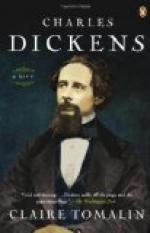The school to which our callow eaglet was sent (in the spring or early summer of 1824), belonged emphatically to the old school of schools. It bore the goodly name of Wellington House Academy, and was situated in Mornington Place, near the Hampstead Road. A certain Mr. Jones held chief rule there; and as more than fifty years have now elapsed since Dickens’ connection with the establishment ceased, I trust there may be nothing libellous in giving further currency to his statement, or rather, perhaps, to his recorded impression,[4] that the head master’s one qualification for his office was dexterity in the use of the cane;—especially as another “old boy” corroborates that impression, and declares Mr. Jones to have been “a most ignorant fellow, and a mere tyrant.” Dickens, however, escaped with comparatively little beating, because he was a day-boy, and sound policy dictated that day-boys, who had facilities for carrying home their complaints, should be treated with some leniency. So he had to get his learning without tears, which was not at all considered the orthodox method in the good old days; and, indeed, I doubt if he finally took away from Wellington House Academy very much of the book knowledge that would tell in a modern competitive examination. For though in his own account of the school it is implied that he resumed his interrupted studies with Virgil, and was, before he left, head boy, and the possessor of many prizes, yet this is not corroborated by the evidence of his surviving fellow pupils; nor can we, of course, in the face of their direct counter evidence, treat statements made in a fictitious or half-fictitious narrative as if made in what professed to be a sober autobiography. Dickens, I repeat, seems to have acquired a very scant amount of classic lore while under the instruction of Mr. Jones, and not too much lore of any kind. But if he learned little, he observed much. He thoroughly mastered the humours of the place, just as he had mastered the humours of the Marshalsea. He had got to know all about the masters, and all about the boys, and all about the white mice—of which there were many in various stages of civilization. He acquired, in short, a fund of school knowledge that seemed inexhaustible, and on which he drew again and again, with the most excellent results, in “David Copperfield,” in “Dombey,” in such inimitable short papers as “Old Cheeseman.” And while thus, half unconsciously perhaps, assimilating the very life of the school, he was himself a thorough schoolboy, bright, alert, intelligent; taking part in all fun and frolic; amply indemnifying himself for his enforced abstinence from childish games during the dreary warehouse days; good at recitations and mimic plays; and already possessed of a reputation among his peers as a writer of tales.
FOOTNOTES:
[1] L200 a year “without extras” from 1815 to 1820, and then L350. See “Childhood and Youth of Charles Dickens,” by Robert Langton, a very valuable monograph.




